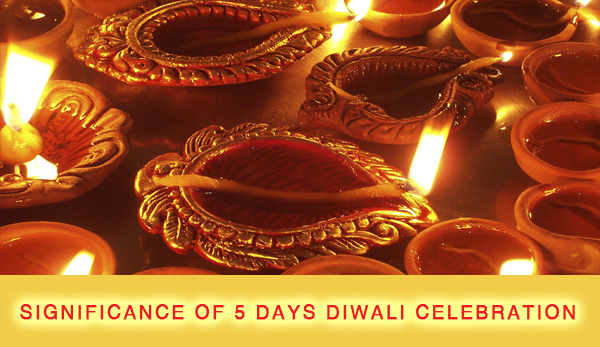Deepawali (festival of lights) is the most celebrated Indian Festival. This sparkling festival transcends boundaries, cultures and religions. Beginning from the long Lakshmi Pooja’s popular night parties and new clothes for every family member is the common ritual seen across this much celebrated festivity. The younger brigade of the family enthusiastically looks forward to burn fiery crackers, colorful and beautiful earthen lamps and lanterns and unique multicolored rangolis for the quick-witted – the festival of Diwali has something in store for every one of us. Not to forget that this is a five-day long festival that stretches for almost the week.
Diwali is a five-day festival and it’s origin goes back to the Puranas for each of the days. It is usually observed by illuminating plenty of candles in various parts of the house and offering plethora of home made sweets and delicacies to the deity. This ceremony was observed firstly by the people of Ayodhya while Lord Rama was in exile, away from his kingdom. The joyful day which is regarded as the return of Lord Rama after 14 long years of exile is coined as Diwali or Deepavali. Deepavali stands for “deepa” which means candles and “vali” means innumerable. Another legend has it that it was also the day on which Lord Krishna performed his childhood past time of breaking the pots of yoghurt and letting himself be bound by Mother Yashoda.
Diwali is the most popular Indian festival as it is celebrated by one and all irrespective of caste, creed and religion. It unites all of us in the name of celebration. Diwali is a festival of joy, happiness, bonhomie. It is above all the festival of lights and celebrated with great enthusiasm by all Indians all over the world. The uniqueness of this festival is it’s harmony of five varied Philosophies, with each day having it’s own significance, thought or ideal. People celebrate each of it’s five days of festivities with true understanding, it will uplift and enrich our lives.
Diwali is the most popular Indian festival as it is celebrated by one and all irrespective of caste, creed and religion. It unites all of us in the name of celebration. Diwali is a festival of joy, happiness, bonhomie. It is above all the festival of lights and celebrated with great enthusiasm by all Indians throughout the world. The uniqueness of this festival is it’s harmony of five varied Philosophies, with each day having it’s own significance, thought or ideal. People celebrate each of it’s five days of festivities with true understanding, it will uplift and enrich our lives.
* The first day of Diwali is called Dhanteras ( Dhanvantari Triodas), and it marks the official beginning of the Diwali festivity. This day has immense significance in many parts of India; people regard this day as very auspicious day in the whole of Hindu calender. The 13th lunar day of the of Krishna Paksh (as per hindu calender), the dark fortnight of the month of Karthik, Dhanteras is an important day. On this day, Lord Dhanwantari is said to have come out of the ocean with Ayurveda, for the benefit of mankind. A huge lavish purchase is carried out on this day. Home makers regard this day as an auspicious day for buying aluminum and steel utensils, gold, silver and precious stones, jewelry, new clothes etc. It is widely noted that regions like Gujarat pay special importance to this day, much more than Diwali and hold Lakshmi, Kuber (the Hindu God of riches) and Ganesha Pooja on this day. People light earthen lamps and candles on this day as well as it kick starts the days long festivity of Diwali.
* Consecutively, the second day of Diwali week is called the Kali Chaudas or Narak Chaturdasi. In some parts of India, it is simply known as Choti Diwali, the day before Diwali.
On this day Lord Krishna smothered the demon Narakasur and freed the world from fear. It is considered that one ought to massage the body with oil to relieve it of tiredness, lethargy, fatigue, bathe and take rest, so that Diwali can be celebrated in full spirit. It is also believed that one should avoid going out instead be at home and relax. Nevertheless in contemporary times, on Choti Deepavali, people go to each other’s abodes to wish Diwali and exchange gifts and sweets.
* The third day of these festivities is the day what Diwali is actually celebrated for, when Goddess Lakshmi is worshiped, along with Lord Ganesha. People lit diyas and candles in their homes and the streets all across India light up the gazillion lights, crackers. After worshiping Goddess Lakshmi in the evening which encompasses the whole family together doing the pooja. There after there is exchange of sweets as prasaad.
* The fourth day is celebrated in sundry forms all across the country. In Gujarat, this day is celebrated with much pomp and show as Bestu Baras, The New Year as per their vernacular calender. In north part of India, this day is celebrated as Govardhan Pooja and Vishwakarma Day, when people worship their instruments, arms and machines (modus operandi). All business enterprises remain closed seeking obeisance to this particular day.
This day is also celebrated as Annakut.
* The fifth day of Diwali festivities is celebrated as the Bhai Dooj/ Bhai Teeka or Bhai Fota. Brothers visit their sisters and the sisters prepare sweets in their honour. They wish them a life full of happiness and long life.
Diwali has and will always remain as a celebration to look forward to. But with rising pollution and devastating effects on the nature, we must also pledge to make this Diwali an “Eco Friendly” affair by sharing love, sweets and joy instead of burning dangerous and harmful crackers. Hence, Go green this Diwali!






























































